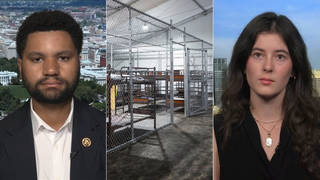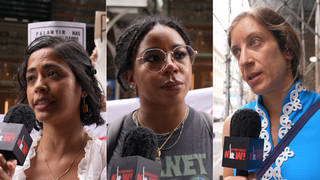
Topics
Guests
- Andrea Pitzerauthor of the forthcoming book, One Long Night: A Global History of Concentration Camps.
Prominent white supremacist and Donald Trump supporter Richard Spencer has praised Trump for not mentioning in a statement commemorating International Holocaust Memorial Day the 6 million Jews killed. Trump has faced widespread criticism for the omission, but the administration has repeatedly defended the statement. Sen. Tim Kaine went as far as calling it a form of “Holocaust denial.” Spencer, however, praised the statement as the “de-Judification” of the Holocaust. We speak to Andrea Pitzer, author of the forthcoming book, “One Long Night: A Global History of Concentration Camps.” It looks at mass civilian detention without trial from 1896 to today.
Transcript
NERMEEN SHAIKH: Prominent white supremacist and Donald Trump supporter Richard Spencer has been back in the news this week after he praised Trump for not mentioning the 6 million Jews killed in a statement commemorating International Holocaust Memorial Day. Trump has faced widespread criticism for the omission, but the administration has repeatedly defended the statement. Senator Tim Kaine went as far as calling it a form of “Holocaust denial.” Spencer, however, praised the statement as the “de-Judification” of the Holocaust.
AMY GOODMAN: Earlier this week, Juan González and I spoke to Andrea Pitzer. Her upcoming book is titled One Long Night: A Global History of Concentration Camps. It looks at mass civilian detention without trial from 1896 to today. Andrea Pitzer began by commenting on Trump’s statement.
ANDREA PITZER: One thing I think is very interesting about the omission of the Jews in the Holocaust Remembrance Day statement is—again, looking back at the history—that it’s perhaps a mistake that that was done at first. It may have been an omission. It’s a very strange omission, given all the concerns that were raised about whether Trump had the support of white nationalists and whether that was reciprocated during the campaign, to have forgotten that, when it would have been an easy thing to do correctly. But even if one gives them the benefit of a doubt that it was an error, when it was pointed out, it was doubled down on, and there was this strange statement that it was actually meant to be inclusive, it was including all groups.
And I think that’s more where it becomes disturbing, because this is one of the lines that we’ve seen in Soviet Russia and in some white nationalist sectors, that, “Well, sure,” they say, “a lot of people died in the war,” as if it were just an inevitable casualty of war. And certainly, tens of millions of people were casualties of combat and other crises during the war, as there are in many wars, but it’s really a singular moment, the attempt to eradicate a people from the face of the Earth. And it was also the Jews, but—especially the Jews, but also the Roma and Sinti, the Gypsies, as they also were known. And this was really—to bend the power of a state during wartime to eradicate people from the face of the Earth, even when it went against your war interests, is just—is a really singular thing. And I think to talk about the Holocaust without acknowledging that is really to miss its singular moment in history.
AMY GOODMAN: So, Andrea Pitzer, I wanted to go to what the White House press secretary, Sean Spicer, said, defending the decision not to reference Jews in Trump’s statement on International Holocaust Remembrance Day.
PRESS SECRETARY SEAN SPICER: I think he’s aware of the—what people have been saying. But I think, by and large, he’s been praised for it. I think the president recognized the tremendous loss of life that came from the Holocaust. But I think, with respect to, you know, Israel and the Jewish people specifically, there’s been no better friend than Donald Trump when it comes to protecting Israel, building a better friendship with Israel. You look at what Prime Minister Netanyahu has talked about. He welcomes this administration. He appreciates the friendship and respect that he has shown to Israel and to the Jewish people. But to suggest otherwise, John, I, frankly—I got to be honest. I mean, the president went out of his way to recognize the Holocaust and the suffering that went through it and the people that were affected by it and the loss of life and to make sure that America never forgets what so many people went through, whether they were Jews or Gypsies, gays, disability, I mean, priests.
AMY GOODMAN: So, that was Sean Spicer, who is the White House press secretary, defending not referring specifically to Jews on Holocaust Remembrance Day. Andrea Pitzer?
ANDREA PITZER: Well, one thing that’s interesting about that is that he said he went out of his way. Well, I don’t think he really went out of his way. Presidents have been issuing these proclamations before, so it’s not some new effort that was made.
And the second thing is, I think that it—the language that was used, and it was something very close to “to ensure that the forces of evil never again defeat the powers of good.” And that goes back to what I was saying before, this idea of stripping out context and history. That sounds like something from Harry Potter. That sounds like some apocalyptic fairy tale. The Holocaust and World War II were very specific events. And I think to sort of neuter them down to these narratives of just simple good and evil that can be carried around and used for other purposes goes to the same kind of trend that the treatment of immigrants does, which, you know, it really doesn’t look at the exact context that we’re in and help us make good judgments about it. It renders it down to something that could be used for propaganda.
JUAN GONZÁLEZ: At the Holocaust Museum in Washington, there is a—one of the signs that’s up there is a placard that says “Early warning signs of fascism,” and it has a list that includes powerful and continuing nationalism, disdain for human rights, identification of enemies as a unifying cause, supremacy of the military, rampant sexism, controlled mass media, obsession with national security, corporate power protected, labor power suppressed, disdain for intellectuals and the arts, obsession with crime and punishment. Your thoughts as—this list of the early signs of fascism at the Holocaust Museum?
ANDREA PITZER: Well, I think the list speaks for itself. At this point, given the blitz that’s been run on the normal democratic process by the administration, that’s just been in for a week and a half at this point, I do think that we have to say that, even now that he’s in power, the authoritarian tendencies that Trump showed before the election are definitely coming into play. I think it’s important to remember, however, that the U.S. is not Nazi Germany in the 1930s. Journalists can report. Lawyers can litigate. Individuals can run for local office and call their representatives and protest. So, whether Trump is actually an authoritarian, he’s not in an authoritarian state at this point. So I think there needs to be a lot of concern, but I do think that there doesn’t need to be panic at this point. It needs to be a kind of strategic awareness and consideration of what our options are as journalists, lawyers, as individuals and citizens.












Media Options